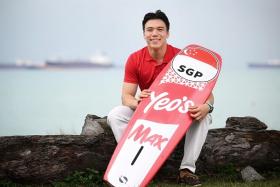Priority for Timor Leste is to learn how to stage the Games, says CDM
CDM Guteres says more than winning medals, their focus is finding out how to stage the Games
When Timor Leste entered this year's SEA Games, they did not set a medal-target but were keen on learning how to host the regional competition.
The young nation made its debut at the Games only in 2003, and this Games was seen as a learning adventure.
Timor Leste's chef de mission Laurentino Guteres hopes that with each new sporting competition his country joins, it is a step closer to emulating the region's powerhouses.
In an interview with The New Paper, the 38-year-old (inset) said: "Singapore is 50 years old this year and Malaysia is already 57.
"Timor Leste is only 13 years old. So these 'seniors' are like parents to us and we want to learn from them.
"They have hosted the many big competitions before. They have the experience, manpower and facilities to develop their athletes well and hire experienced coaches."
The nation's sporting dreams have come along some way though, as they won two gold medals, three silver and five bronzes at the last Games in Naypyidaw - their highest medal count yet.
However, at this year's Games, Timor Leste have managed only a silver medal in taekwondo and a bronze in boxing.
The biggest challenge for them, according to Guteres, is the poor economy and the lack of funding.
In the past years, their government has allocated around US$6,000 annually to their Ministry of Youth and Sports to help pay for the coaches' salaries, training sessions, athletes' nutrition and other administrative matters.
For this Games in Singapore, their government granted their national sports council US$700,000 ($940,000).
He said: "Sports is a priority in Timor Leste, but there are more important issues such as our infrastructure, healthcare and education.
"Those are more important right now, because we want to build up our economy.
FUNDING
"The funding we receive every year can differ, sometimes it's higher but sometimes, like last year, it was lower."
Apart from funding from the government, the Timorese athletes also get support from Olympic Solidarity, an International Olympic Committee (IOC) organisation that provides financial support to needy National Olympic Councils.
For Timor Leste, this IOC support provides their athletes opportunities to train under foreign and more experienced coaches.
They were able to bring in South Korean Lee Jaeoh as their taekwondo head coach because of this programme.
The South Korean was responsible for coaching Luisa dos Santos Rosa, who won a silver here.
Henrique Martins Borges Pereira (inset) was the other medallist with a bronze in men's welterweight boxing.
Timor Leste also have an agreement to send two swimmers overseas for 12 months of altitude training in Thailand to prepare for next year's Olympic Games in Rio.
The challenges that lie ahead for the young country are daunting but Guteres believes that with support from other countries, Timor Leste can only move forward.
He recalled the speech by Mr Lawrence Wong, Minister of Culture, Community and Youth, at the opening ceremony of this Games on June 5 as his inspiration.
In his speech, Mr Wong, also the chairman of the 28th SEA Games steering committee, said that the Games was about fostering bonds of friendship and strengthening a country's regional solidarity.
Guteres hopes this solidarity and friendship from neighbouring countries, as well as being officially recognised as a member of Asean, will help Timor Leste improve its sporting development.
Get The New Paper on your phone with the free TNP app. Download from the Apple App Store or Google Play Store now



